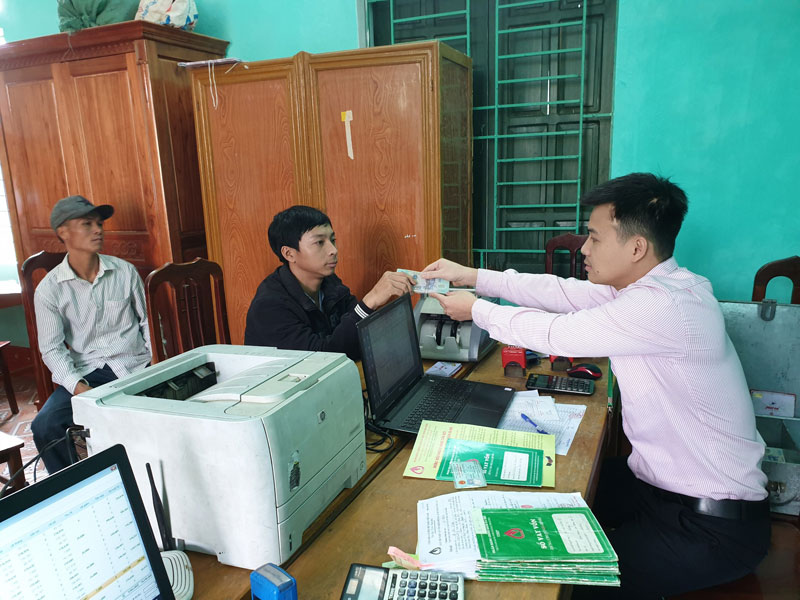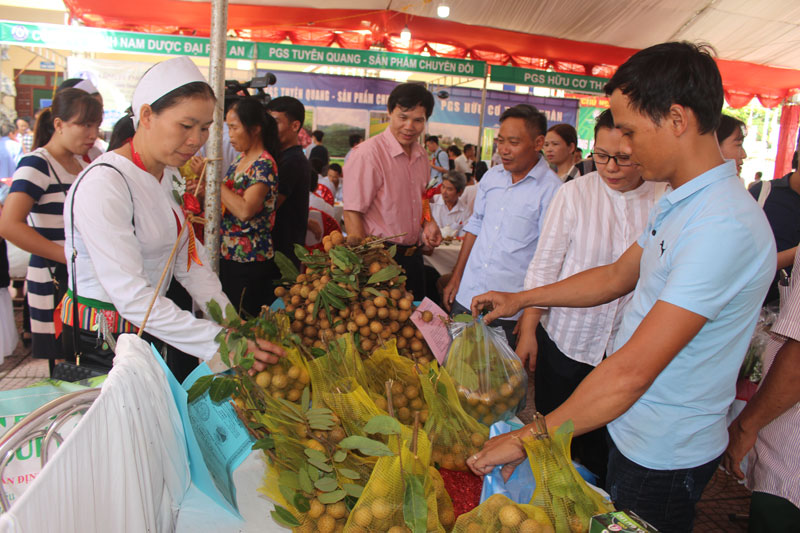
Mr. Nguyen Anh Duc, the Head of Luong Son Department of Agriculture and Rural Development says that Luong Son People's Committee has been determined to build the production chain towards good agricultural practices (VietGAP), ensuring food safety, with the non-business capital and production support capital under the Program of the New Rural Construction.
Specifically, Luong Son district has supported nearly 200 million VND for Vai Dao Cooperative of Agriculture and Trade Service to build VietGAP label chain. They have supported 99 million VND for Thuan Phat Cooperative of Agriculture and Service to build and certify the chicken chain under VietGAP standard. They have also supported 103 million VND for Tan Thanh cooperative to build and certify pomelo under VietGAP standard. Supporting the businesses and the cooperatives is to promote the consumption and create the safe production and supply areas.
 Meeting VietGAP standards, the label products of Vai Dao Cooperative of Agriculture and Trade Service, Cao Ram commune (Luong Son) has been consumed well in the market.
Meeting VietGAP standards, the label products of Vai Dao Cooperative of Agriculture and Trade Service, Cao Ram commune (Luong Son) has been consumed well in the market.
Luong Son district has also created conditions for businesses and cooperatives to introduce, promote the products, associate with the enterprises for the product distribution and consumption. Happily, since the chains have been built so far, the difficulties in consuming products have been basically solved. There is no situation of products which are produced but they cannot be consumed or the price fluctuations and the consumption must be done in the free market. In particular, some agricultural production cooperatives have signed big consumption contracts such as Tan Thanh agricultural cooperative.
In 2019, VietGAP agricultural value chains have been continuing to maintain and promote the efficiency. On the other hand, the district is implementing the steps to implement the project of improving and developing the beef cattle in 10 communes in association with the program of new rural construction. The district has deployed the value chains into a brand-building plan for the local strong agricultural products and promoted the OCOP Program, creating an advantageous product for each commune.
The Standing Board of the Hoa Binh provincial Party Committee has agreed in principle on a proposal by the Standing Board of the Party Committee of Hoa Binh city to gather feedback on the city’s 1:2000 zoning plan, which forms part of its broader urban development strategy.
Hoa Binh province has made notable progress in public administration reform and digital government development, with the satisfaction index among citizens and businesses reaching over 84%, according to recent government evaluations.
Thanks to great efforts by local authorities in recent times, the governance and public administration performance of Mai Chau district has been significantly improved.
In the afternoon of June 6, the Party Committee, the People's Council, the People's Committee and the Fatherland Front of Lac Son district solemnly held a meeting to celebrate the 139th anniversary of the district's founding (1886–2025) and the 79th anniversary of the establishment of the district's Party Committee (1946–2025). There was the attendance of Mr. Bui Van Thang, the Vice Chairman of the Provincial People's Council; Mr. Quach Tat Liem, the Vice Chairman of the Provincial People's Committee; Ms. Dang Bich Ngoc, the Deputy Head of the National Assembly Delegation of the province; as well as the former leaders of the province and district through various periods, who are the natives of the district.
Implementing the Politburo’s Resolution No. 57-NQ/TW on breakthroughs in science – technology, innovation, and digital transformation is a golden opportunity for the northern mountainous province of Hoa Binh to renew growth model, improve competitive edge and shorten digital gap.
Resolution 57-NQ/TW, issued by the Politburo on December 22, 2024, identifies sci-tech, innovation, and digital transformation as strategic breakthroughs to build a developed and prosperous nation. In Hoa Binh province, this spirit is not just a slogan, it’s being put into action through concrete initiatives that form a "new development triangle”: digital citizenship, digital economy, and digital administration.



 Meeting VietGAP standards, the label products of Vai Dao Cooperative of Agriculture and Trade Service, Cao Ram commune (Luong Son) has been consumed well in the market.
Meeting VietGAP standards, the label products of Vai Dao Cooperative of Agriculture and Trade Service, Cao Ram commune (Luong Son) has been consumed well in the market.